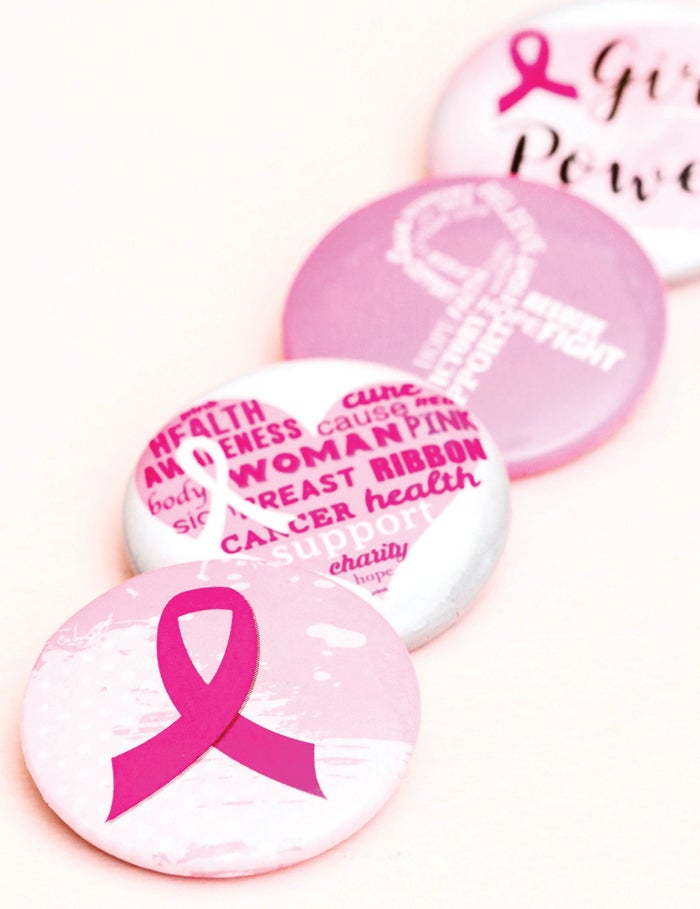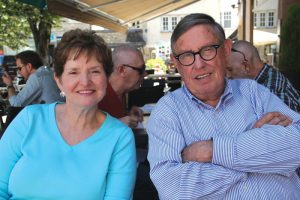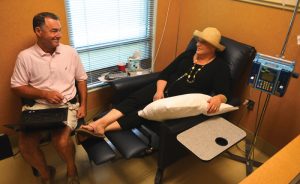Three breast cancer journeys: Jewell Mayberry, Bonnie Corriher, Melissa Shue
Published 12:00 am Sunday, October 28, 2018

- October is breast cancer awareness month
October is Breast Cancer Awareness Month. Among all the pink paraphernalia are real women who are battling this very real disease. Many women in Salisbury are breast cancer survivors. The three we highlight today may share the same diagnosis, but are all on different journeys. We lift up every woman — and indeed, every family member — affected by breast cancer. We are with you. We are praying for you. You are not fighting alone.
∞∞∞ ∞∞∞ ∞∞∞
By Susan Shinn Turner for the Salisbury Post
Jewell Mayberry

Jewell Mayberry
Photo by Susan Shinn Turner
At 6 feet 1 inches tall, with a shock of silver, spiky hair and jaunty red glasses, Jewell Mayberry is hard to miss.
On this Indian Summer evening, she’s wearing a black T-shirt with the words “Fighter Survivor Warrior” on it.
Jewell, a survivor of three separate cancers, is indeed a warrior. Later on, in the handicapped bathroom stall of a downtown restaurant, she lifts that T-shirt to reveal a horizontal scar across her chest — the scar from her latest cancer battle.
At 40, Jewell was diagnosed with colon cancer. At 50, she had melanoma. And at 63, during a routine mammogram in September 2017, she got a call back.
“Of course, I thought nothing of it,” she says. She and her husband, David, were, in fact, on their way the airport, headed to Scotland for three weeks.
After her return, she had a second mammogram. A needle biopsy and ultrasound later revealed a cancerous tumor and that a bilateral mastectomy was needed.
“I tend to have cancer,” Jewell notes, “but I miss my breasts!”
She may have reconstruction at some point, she says. “Prostheses were hell on earth — for me. I felt like I was wearing feed bags. And wearing them plus a wig, I’d melt like a Dali painting.”
In November, she had surgery, followed by chemo and radiation.=
Jewell and David, a local dentist, have two children, Sarah Scott, 38, who lives in Arkansas, and Matt, 36, who lives in California. Sarah came home several times during Jewell’s chemo treatments.
She had 16 chemo treatments — including the first four “Red Devil” treatments which are especially tough, followed by 33 radiation treatments.
“The next 12 treatments are not as bad,” she says, “but you’re worn out. It’s a tough, tough treatment.” Jewell, a retired English professor, calls cancer “the most humbling, alienating, isolating experience I’ve ever had.” “With cancer, you cut it out, then you poison it, then you burn it, to cure it,” she adds. “It’s barbaric.”During the worst of treatment, she says, she was either throwing up, asleep, or curled up in the fetal position. Still, she says, she experienced unexpected kindnesses from people. Handmade lap quilts. Prayers.
Being on prayer lists in Sunday School classes, at churches, being prayed for by people she didn’t even know. Her hairdresser who bought her one of every cupcake at Abigail’s.Last year, she and David bought a beach house at Oak Island, and Jewell spent many a weekend there, lying around, just to have a change of scenery. When she couldn’t sleep, she’d sit up watching “crappy TV.” She still has the hundreds of cards she received.
She finished radiation in August, and two weeks later, she and David went to India, Thailand and Malaysia for three weeks.
“He’s been an incredible caregiver,” she says of David, who recently sold his practice to Dr. Hetal Amin-Patel, and contracts with her. “If he’d been in his own office, he couldn’t do all this.”
Jewell’s mother died when Jewell was 16, and Sarah was 15 and Matt was 13 when Jewell was diagnosed with colon cancer. She was absolutely determined not to leave her children, she says.
And she’s happy to talk with people about her experience with breast cancer, she says. “It was not pleasant, but I am thrilled and grateful for every minute. I want it to be obvious that I am thrilled.”
∞∞∞ ∞∞∞ ∞∞∞
Bonnie Corriher

Bonnie and Fred Corriher
When Bonnie Corriher went for a 3-D mammogram May 8, she wasn’t particularly concerned about the call back. She’d had abnormal mammograms in 1980 and 1982, which turned out to be benign cysts, and her mammogram last year was normal.
“I thought, well, it’s 3-D and those are really sensitive,” she says.
But when she and her husband, Fred, received the news that she had a grade 3 malignant tumor, stage 1A breast cancer, on June 1, “that really threw us.”
Bonnie’s cancer was classified as HER negative, and her lymph nodes were clear. She had a lumpectomy July 5, and her oncologist, Dr. William Brinkley, sent the tumor for genetic testing.
“We had every reason to believe this was caught early,” Bonnie says.
But the pathology report concluded there was a high risk that the cancer would return within five years, and it could go somewhere else. With chemotherapy, that risk dropped from 29 percent to 5 percent. Those improved odds sounded good to Bonnie.
Not so good were the four chemotherapy treatments every two weeks with a combination of two drugs that patients call “The Red Devil.”
“That’s pretty intense treatment,” Bonnie admits.
She’s now taking chemo once a week every 12 weeks that’s not as intense and much more manageable, she says. She’ll finish up at Christmas, and undergo five to seven weeks of radiation, five days a week, after that. She’ll then take oral medication for five years.
On her current course of treatment, she comes home and rests the day of chemo.
“The anti-nausea medication makes me sleepy,” she says. “Then the next day is great.”
She sometimes has joint pain late in the days following treatment, but ibuprofen and Tylenol take care of it.
“It is very manageable,” she says of this second round of chemo.
Bonnie, 66, and Fred, who turned 80 this year, have been married 42 years. Fred has had his own health challenges. He’s been fighting bladder cancer since 2011, but it is under control, Bonnie says.
“He’s my caregiver, and he’s a trouper,” she adds. “He sees his urologist every three months. We’re hopeful he’s gonna be all right. He just turned 80 and he’s still going strong.”
Bonnie says that her breast cancer has been the biggest challenge of their marriage.
“I have just always been healthy,” she says. “I’ve usually been the caregiver.”
Bonnie, who is a nurse, was still working in a doctor’s office when she was diagnosed with breast cancer. Now on short-term disability, she hopes to return to work during radiation.
“It’s been an adjustment for all of us,” Bonnie notes. “I’m not used to being waited on. But Fred is a godsend. Between him and my children and my sister, it’s been a group effort. But Fred’s been the main one. He goes to every appointment and every treatment with me. He is amazing.”
She continues, “When you have a diagnosis like this, it’s unbelievable how many women come to you who have been through the same thing. I had no idea. People are so kind and offer to help, and it’s a sincere offer.
“When you’re not accustomed to needing assistance, it’s an adjustment. But I’m learning to adjust.”
∞∞∞ ∞∞∞ ∞∞∞
Melissa Shue

Mark and Melissa Shue
Mark Shue has a message for every woman out there, and for every man who has a female friend or relative.
“Just make sure you tell everyone you know to get a mammogram,” he says. “This happened in a year, and it’s aggressive.”
Mark’s wife, Melissa, was diagnosed in June with breast cancer. It is an aggressive cancer, characterized as HER2 positive.
Like a lot of women, Melissa admits her life was hectic when her appointment came around. But a voice told her, “Just do it and get it over with.”
She got a callback after her appointment, and didn’t think much of it. She was preparing for a family trip to Atlanta, but was totally unprepared for the more extensive testing and ultrasound that preceded her diagnosis on June 29.
“When the doctor comes in,” Mark admits, “you go deaf. You hear it, but you don’t hear it. Hearing that diagnosis was an out-of-body experience.”
Melissa, 53, and Mark, 54, did get to go to Atlanta.
“But then we were put on the fast track,” Melissa says.
She got more test results on July 3, and a port inserted July 12. On July 16, she started chemotherapy, one day a week every three weeks. On Oct. 30, she’ll complete the last of six treatments. She’ll likely have surgery in December or maybe sooner — at this point, she’s undecided on lumpectomies or a double mastectomy. The cancer is in both breasts. She’ll also undergo genetic testing and seek input from her surgeon.
This particular morning finds Mark and Melissa at her fifth treatment, the drugs being sent into her port via an IV, connected to a machine that beeps from time to time.
“Before you have breast cancer, you know it’s no walk in the park,” Melissa says. “But you just have no idea. The exhaustion is just bone crushing. Chemo brain is no joke. The word ‘foggy’ doesn’t even describe it. It’s disorienting.”
The whole experience, Melissa says, has been humbling. And it’s changed her relationship with Mark, her husband of 29 years.
“I actually gave her a haircut when her hair started falling out,” Mark says.
“I realized Mark loves me for me,” Melissa says. “It’s a different kind of love. It’s a genuine, authentic love.”
“I just care for her the best way I know how,” Mark says.
The first three chemo treatments were not pleasant, Melissa says. The next two were a game changer — in a bad way. Mark and Melissa persevered.
Over the years, Melissa has typically been the caregiver, she says, helping Mark manage his type 1 diabetes, and in raising their three children.
“It’s never 50-50,” Mark says of a couple’s duties. “Sometimes it’s 90-10.”
“It’s easier for me to be the caregiver,” Melissa admits. “It’s harder for me to be on the receiving end. But you just cannot do cancer alone. We are extremely grateful for all of the support. It’s an unbelievable, unconditional love that we will never forget. It will stay with us our whole lives.
Mark has been with Carolina Caterpillar in Charlotte for 34 years, but has been able to work from home recently and goes with Melissa to all of her appointments and treatments. Melissa is working as much as she can in her role as prevention and education coordinator at Prevent Child Abuse Rowan.
She very much appreciates all the dinners, cards, flowers, support from their congregation at Milford Hills Methodist, facebook posts, kindnesses from her oncology nurses, and messages from her high school and college classmates.
“We’re going way back with the love,” she says. “It’s all overwhelming. Every act of kindness has had a profound effect long after it was performed. This was not planned, of course, but we are looking for the silver linings.”
Melissa admits she’s tired from the chemo but says, “We’ve really tried to focus on what we are gaining. This diagnosis has a lot of uncertainty. I find myself reevaluating my life and how I spend my time. It makes you focus. I’m also trying to use this time to discern what life moving forward needs to look like.”
Following surgery, Melissa will complete chemo and radiation in August 2019, then take a hormone blocker for the next five years. It’s likely to cause hot flashes and irritation, she says, then looks at Mark. “I’m so sorry.”
Mark smiles. “We’ll get through it,” he says.
She tries to conserve as much energy as she can on the days she’s not feeling well. On the good days, she says, “I’m desperate to live life.”
Melissa recently came upon the following passage in her morning devotions: “Don’t see your struggle in life as an interruption to life but as a preparation for life. No one said it would be easy or painless. God will use this for something good.”
“He already has,” Melissa says.
She remembers well the day she told family members about her diagnosis. It’s been especially hard on their son Graham, 10, a fourth-grader at Salisbury Academy. Several families there have taken him under their wing to give him a sense of normalcy and to keep his regular routine.
Mark tears up when he says that Graham told a counselor he wanted to sell his toys to buy food in order to survive in case his mom died.
“He sees me buying groceries,” Melissa explains.
“And I’m chopped liver,” Mark says, grinning through his tears.
But Melissa and Mark have explained to Graham that while people do get sick with cancer, they also recover.
“I’ve got way too much to do,” Melissa says. “I don’t have time to die.”





